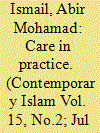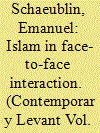| Srl | Item |
| 1 |
ID:
180003


|
|
|
|
|
| Summary/Abstract |
Recent studies conclude that ethnic minority families in Denmark tend to be dismissive of senior housing and municipal homecare services for elderly family members. A large proportion of Muslim minority families in Denmark attach great importance to caring for the elderly as a tradition and prefer to take care of their own elderly family members at home. Nevertheless, the fact that morality, incentives, and obligations in relation to care for the elderly may be legitimized and/or contested with reference to cultural traditions and Islam has not received much attention in current research. In this article, drawing on material from ongoing ethnographic fieldwork among Arab Muslim families in Denmark, I discuss how cultural and religious backgrounds may determine and influence perceptions and behavior regarding care for the elderly. By observing and engaging in the everyday life of an Arab Muslim family, I explore how caring for elderly people with health problems at home raises specific questions about obligations and triggers negotiations across genders and generations. I argue that besides kinship and ethnicity, it is equally important to consider religiosity in an attempt to learn more about how Arab Muslims care for their elderly family members.
|
|
|
|
|
|
|
|
|
|
|
|
|
|
|
|
| 2 |
ID:
169283


|
|
|
|
|
| Summary/Abstract |
Zakat is the Islamic obligation to give away a share of one’s moveable wealth for the sake of the community—primarily supporting people in need. Based on fieldwork in the Palestinian city of Nablus (2013–2014) where institutional channels for distributing zakat had become blocked due to security crackdowns in 2008, this article analyses direct zakat practices where givers and receivers confront one another in face-to-face interaction. In Nablus, openly displayed material want was assumed to ‘expose’ people living in poor households as well as their relatives and neighbours. Against this background, direct zakat manifested itself as discreet gestures of ‘covering’ need, while people not asking openly for support tended to be praised for their shyness and piety. In direct zakat transfers, people actively cared for how they appeared to one another in social interactions. This ‘ethical work’ of presenting oneself involved reading signs, embodying Muslim virtues and invoking God as the sole source of material provision. Considering the Islamic tradition’s presence within social interactions, this article seeks to understand how Muslim piety exceeds the individual and how the moral responsibility to cover the needs of others is socially distributed.
|
|
|
|
|
|
|
|
|
|
|
|
|
|
|
|
| 3 |
ID:
154695


|
|
|